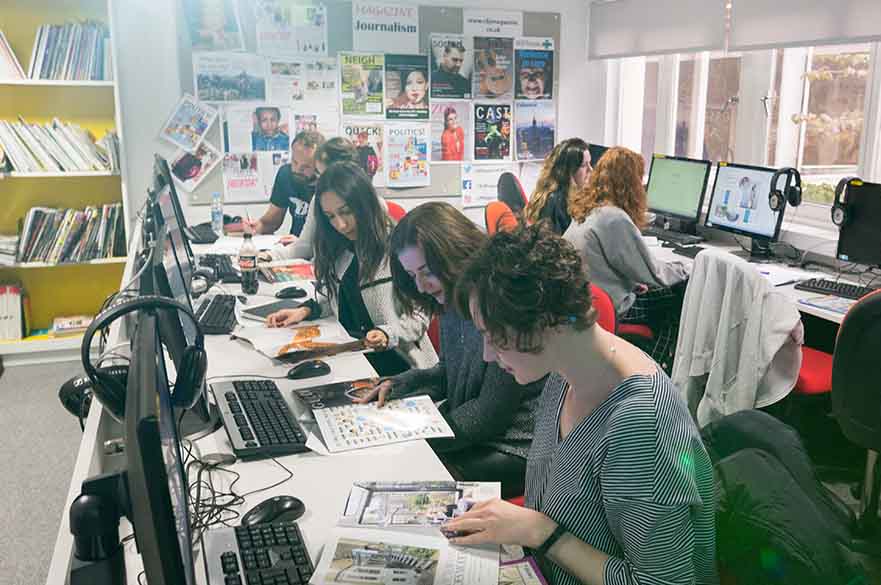Sports Journalism MA
About this course
Get ready to dive headfirst into the exhilarating realm of sports journalism.
Imagine yourself right in the action, crafting stories that resonate across all media platforms – from thrilling broadcasts to engaging digital content and impactful written pieces.
Get set to explore how sports coverage is driven by data insights and fuelled by the dynamics of social media, playing a pivotal role in the success of major media brands.
You could be scoring interviews with top athletes, delivering live commentary on the side-lines, breaking down strategic plays, and placing sports within the larger context of history and society.
You will unleash your creative flair in the UK's biggest student newsroom, with access to state-of-the-art TV studios, cutting-edge radio and podcast setups, and the latest industry-standard tools for production and design.
And where better to kick-start this thrilling journey than Nottingham, the ultimate city of sport? Immerse yourself in Premier League football, international cricket, tennis showdowns, ice hockey face-offs, and so much more. With iconic venues like the National Ice Arena, Trent Bridge Cricket Ground, and the National Water Sports Centre, Nottingham is the ultimate playground for honing your sports journalism prowess.
-
Where better to study than the home of the world's oldest professional association football club, which even pre-dates the FA!
-
Study in the industry standard Centre for Broadcasting and Journalism facility set in the heart of the city centre.
-
100% of NTU's research submitted to the 'Communication, Cultural & Media Studies, Library & Information Management Unit of Assessment was rated world-leading or internationally excellent in terms of research impact - REF 2021.
Industry recognition

We are proud to be part of the BAFTA Albert education partnership

This course is accredited by the National Council for the Training of Journalists (NCTJ)
What you’ll study
-
Core modules
Sports Journalism Production (40 credit points)
Embark on a transformative journey into multiplatform sports journalism. This module hones career-driven skills essential for writing, digital, and broadcast media. Dive into research, interviews, and broadcasting techniques to develop your technical prowess with audio, video, and editing. Discover the power of social media and ethical journalism and craft impactful content for diverse platforms, from print to online. You will be identifying compelling stories, operating studios, and shaping news narratives, whilst real-world placements and practical experiences drive your growth as a journalist. This module also includes a reflective blog, assessing your readiness for the dynamic industry.
Social Media and Audience Analytics (20 credit points)
Get ready for a captivating module with dual themes. Explore the dynamic realm of social media's impact on journalism and society through critical discourse, drawing from journalism research, media studies, and ethics. Uncover practical tools to craft compelling social media content, backed by audience analytics to elevate your critical thinking, questioning, and creative prowess.
Sport: Challenges and Controversy (20 credit points)
Can you ever leave the politics out of sport? This module explores the development of sport through a series of themes to help you understand the origins today’s global sporting world – and prepare you to cover it. Themes include class, race, gender, sustainability, decolonisation, disability, commerce and celebrity.
Questions you might consider on this module include:
- Why do overseas consortia keep buying high profile English football teams?
- Why do world class female athletes earn less than their male counterparts?
- Is it time to allow all athletes to use performance enhancing drugs?
- Should sport governing bodies be allowed to govern athlete’s bodies with arbitrary gender-identity rules?
- Is the Olympics the pinnacle of our shared human experience… or a cynical money-making corporate venture?
- Can multi-billion-dollar sporting competitions ever be green?
As sports journalists you’ll spend as much of your time reporting on the challenges and controversies surrounding sport as you will the on-pitch action. This module will help you understand the issues you might cover on day one of your job.
Media Law and Ethics (20 credit points)
Enter the dynamic world of media law to grasp its impact and scope. You will acquire the essential professional compliance skills and practical know-how to allow you to navigate areas like defamation, privacy, and copyright. Develop critical understanding of key legal principles for various journalistic platforms and gain practical skills in recognizing publication risks and amending content. Explore the effects of reporting restrictions on journalism to elevate your legal awareness and excel in the media landscape.
Sports Journalism Project (60 credit points)
Embark on the capstone module, showcasing your mastery in journalism or research. Tailor your assessment, whether delving deep into industry dynamics, crafting compelling storytelling, or collaborating on group projects. Explore cutting-edge techniques with a supportive supervisor, engaging in personalized sessions. Your assessment includes a plan, journalistic output, critical commentary, and industry presentation. Choose from:
- The Negotiated Dissertation: Unearth industry insights through research, culminating in an 8,000-10,000 word dissertation.
- The Individual Negotiated Project: Craft long-form storytelling across mediums, shaping a TV film, radio show, or multimedia feature.
- The Group Negotiated Project: Collaborate on a shared topic, creating diverse outputs while retaining individual reflections.
- The Negotiated Work-Based Learning Project: Partner with industry experts, moulding your project to real-world demands.
Choose one
Data-driven Investigations (20 credit points)
Discover data-led investigative projects in journalism. Explore the fusion of industry practice and theoretical discourse to gauge the impact of data journalism on society. Uncover new digital methods to power your research and enhance your multiplatform storytelling abilities. Delve into the world of open data and alternative sources of information. Gain the skills to analyse, understand, and interpret statistical data for your news audience. Create compelling journalistic content from data-driven insights.
Podcasting Production (20 credit points)
Immerse in podcasting's dynamics: theory, production, and impact. Master skills for crafting professional podcasts. Explore the intersection of traditional audio with contemporary journalism, while you probe popular narratives, context, and economics. Learn from experts, grasp the podcasting landscape, and hone your podcasting prowess.
Exploring Promotional Cultures (20 credit points)
Explore cross-cultural PR and content creation. Acquire coveted modern communication skills while learning from diverse alumni guest speakers. Embrace teamwork, devising roles for clarity and commitment in industry-relevant group projects.
We regularly review and update our course content based on student and employer feedback, ensuring that all of our courses remain current and relevant. This may result in changes to module content or module availability in future years.
How you're taught
Study methods and assessment
Study methods include practical sessions, research, lectures, seminars, workshops and professional practice. Learn from your peers, and guest speakers.
Assessment is by a mixture of portfolio work, projects, essays, and exams.
Work experience
Get ready for hands-on learning that's at the very core of this program. Whether in core or optional modules, the practical aspect immerses you in real journalistic work, making you think and act like a pro.
Picture yourself in the action of over fifteen vibrant NewsDays, where you'll whip up content for our public platforms – websites and social media. Some of these days are even guided by graduates working in the industry. This isn't just a simulation; it's a genuine industry warm-up that blends perfectly with the standards set by the National Council for the Training of Journalists (NCTJ) and the Broadcast Journalism Training Council (BJTC).
And when it's time for your capstone project, let your creativity take the lead. Choose your own adventure, shaping your skills and knowledge into a major piece of work that will interest future employers. In some cases, potential employers might even pitch in with live briefs for your capstone projects. And for those aiming for research-focused careers, fret not – we're keeping the theoretical option alive and well.
But that's not all. We believe in getting you out there to gain some serious experience. You'll spend a minimum of fifteen days on the job, mingling with various organizations and businesses – from your local area to a global stage. It's your chance to learn, network, and shine in the journalism world.
Professional practice
Students are encouraged to work to professional standards and are expected to be punctual, meet deadlines, work in teams and contribute ideas.
Learn a new language
Alongside your study, you also have the opportunity to learn another new language. The University Language Programme (ULP) is available to all students and gives you the option of learning a totally new language or improving the skills you already have. Learning a new language can enhance your communication skills, enrich your experience when travelling abroad and boost your career prospects. Find out more about the University Language Programme.
Careers and employability
Your career development
Graduates will work as sports journalists for regional, national and international sports journalism brands such as the BBC, ITV, Sky Sports, The Athletic, BT Sport and Reach. They will also move into other areas of the media, including digital marketing and PR, content creation for sporting organisations and event/stadium hosts for live sporting events.
Campus and facilities
Our award-winning range of journalism courses is based in the Centre for Broadcasting & Journalism, centrally placed on our City Campus. This multi-million-pound development includes one of the largest student newsrooms in the UK, a fully functioning TV studio with production facilities and three radio studios. Find out more ...
Entry requirements
- You will need a good honours degree (minimum 2.1) and enthusiasm for, or experience of journalism.
- Applicants with a 2.2 and substantial experience will be considered.
Applications from candidates with non-standard entry qualifications will be considered on an individual basis if they can demonstrate relevant professional experience.
Written journalism test
All journalism applicants will be asked to submit a written piece as part of their application. View written test. This will be judged against clear criteria. When assessing sample writing manuscripts we are looking for work of at least a satisfactory (pass) standard in terms of language, content, observation, structure and voice.
Recognition of Prior Learning
NTU may admit a student with advanced standing beyond the beginning of a course, through an assessment of that student's prior learning, whether it is certificated or uncertificated. Our Recognition of Prior Learning and Credit Transfer Policy outlines the process and options available to these prospective students, such as recognising experiential learning or transferring to a similar course at another institution, otherwise known as credit transfer.
All prospective students who wish to apply via Recognition of Prior Learning should initially contact the central Admissions and Enquiries Team who will be able to support you through the process.
Getting in touch
If you need more help or information, get in touch through our enquiry form
You will need the equivalent to:
- You will need a good UK honours degree (minimum 2.1) and enthusiasm for, or experience of journalism.
- Applicants with a 2.2 and substantial experience will be considered.
International qualifications
We accept qualifications from all over the world – check yours here:
Postgraduate preparation courses (Pre-Masters)
If you don’t yet meet our entry requirements, we offer Pre-Masters courses through our partner Nottingham Trent International College (NTIC), based on our City Campus:
English language entry requirements
You can meet our language requirements by successfully completing our pre-sessional English course for an agreed length of time, or by submitting the required grade in one of our accepted English language tests, such as IELTS:
Written journalism test
All journalism applicants will be asked to submit a written piece as part of their application. View written test. This will be judged against clear criteria. When assessing sample writing manuscripts we are looking for work of at least a satisfactory (pass) standard in terms of language, content, observation, structure and voice.
Would you like some advice on your study plans?
Our international teams are highly experienced in answering queries from students all over the world. We also have members of staff based in Vietnam, China, India and Nigeria and work with a worldwide network of education counsellors.
- Complete this simple form to keep in touch with the International Office.
Fees and funding
Course fees for 2025 entry:
Course | Full-time Home (UK) tuition | Part-time Home (UK) tuition* |
|---|---|---|
MA Sports Journalism | £9,900 | £4,950 |
* Please note that if you are considering a course that runs over more than one year, the tuition fee stated is for the first year of study. The course fee for the second year may be subject to annual review.
Alumni Discount
We’re happy to be able to offer a 20% alumni discount to most current NTU students and recent NTU alumni. This discount is currently available for those starting an eligible postgraduate taught, postgraduate research or professional course.
Preparing for the financial side of student life is important, but there’s no need to feel anxious and confused about it. Please take a look at our postgraduates’ guide funding page for information about sourcing grants, bursaries and scholarships, and much more.
Getting in touch
For more advice and guidance, you can contact our Student Financial Support Service on +44 (0)115 848 2494.
Course fees for 2025 entry:
Course | Full time International and EU tuition | Part time International and EU tuition* |
|---|---|---|
MA Sports Journalism | £17,850 | £8,925 |
* Please note that if you are considering a course that runs over more than one year, the tuition fee stated is for the first year of study. The course fee for the second year may be subject to annual review.
Scholarships
We offer scholarships of up to 50% of your tuition fee. You can apply for your scholarship when you have an offer to study at NTU.
Living costs
Get advice on the cost of living as an international student in Nottingham and how to budget:
Paying fees
Find out about advanced payments, instalment plan options and how to make payments securely to the University:
Would you like some advice on your study plans?
Our international teams are highly experienced in answering queries from students all over the world. We also have members of staff based in Vietnam, China, India and Nigeria and work with a worldwide network of education counsellors.
- Complete this simple form to keep in touch with the International Office.
How to apply
If you are interested in joining us in September 2025, this course will open for applications through the applicant portal from September 2024. Courses starting in January 2026 will be open for applications from July 2025.
Ready to join us?
Just click the Apply button at the top of the page and follow our step-by-step guide. You can apply for this course throughout the year. Most of our postgraduate and professional courses are popular and fill up quickly though, so apply as soon as you can.
Writing your application
Be honest, thorough and persuasive in your application. Remember, we can only make a decision based on what you tell us. Make sure you include as much information as possible, including uploading evidence of results already achieved, as well as a personal statement.
Keeping up to date
After you’ve applied, we’ll be sending you important emails throughout the application process - so check your emails regularly, including your junk mail folder.
You can get more information and advice about applying to NTU in our postgraduates’ guide. Here you’ll find advice about how to write a good personal statement and much more. Good luck with your application!
Getting in touch
If you need any more help or information, please contact us at Ask NTU or call on +44 (0)115 848 4200.
If you are interested in joining us in September 2025, this course will open for applications through the applicant portal from September 2024. Courses starting in January 2026 will be open for applications from July 2025.
Apply online through our NTU applicant portal.
Application advice
Apply early so that you have enough time to prepare – processing times for Student visas can vary, for example. After you've applied, we'll be sending you important emails throughout the application process – so check your emails regularly, including your junk mail folder.
Writing your personal statement
Be honest, thorough, and persuasive – we can only make a decision about your application based on what you tell us:
Would you like some advice on your study plans?
Our international teams are highly experienced in answering queries from students all over the world. We also have members of staff based in Vietnam, China, India and Nigeria and work with a worldwide network of education counsellors.
- Complete this simple form to keep in touch with the International Office.






